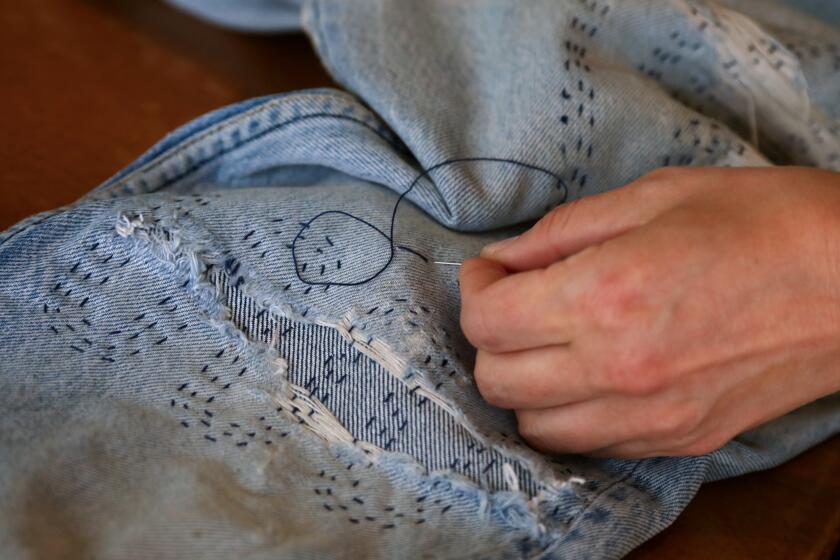Bratz rebuffed, but saga far from over
Day One: Bratz held hostage.
The fate of the hugely popular dolls -- either beloved fashionistas or streetwalkers-in-training, depending on whom you talk to -- was unclear Thursday in the wake of a federal court order that handed the rights to the dolls and the Bratz name to the biggest toy maker of them all: Mattel Inc.
Also in limbo was the fate of MGA Entertainment Inc., the Van Nuys company that manufactures the Bratz and marketed them into an international phenomenon, illegally as it turned out.
The Bratz line, which debuted in 2001, is slated for recall and possible destruction in February unless U.S. District Judge Stephen G. Larson is swayed by further MGA arguments in the long-running copyright infringement case or an appeals court rules in MGA’s favor.
Larson’s order stemmed from a July jury decision that the creator of the Bratz doll came up with the design while working for Mattel under an exclusivity contract. He took the design to MGA, but the jury said it really belonged to Mattel, and the judge applied the sweeping penalty Wednesday.
At a Toys R Us store in Los Angeles three weeks before Christmas, you’d never know the Bratz were endangered. Half an aisle was devoted to the brand, including the Bratz Holiday Absolute Angel doll and Cloe the Bratz Play Sportz Xtreme Kickboxing doll, plus accessories.
Wandering through the pinkish glittering selection, Myra Villeda, 30, of Los Angeles browsed for her 8- and 9-year-old daughters. She said they much prefer Bratz to the long-reigning queen of fashion dolls, Mattel’s Barbie.
“Bratz are just cooler, with their eyes and makeup done up more like how real women do it,” Villeda said. “Barbies are more old-fashioned. Bratz are the ones with the cool clothes.”
Those clothes, often hip-hugging with bare midriffs, made Bratz the primary target of a 2007 American Psychological Assn. report from its Task Force on the Sexualization of Girls.
Describing the Bratz as dressed “in sexualized clothing, such as miniskirts, fishnet stockings and feather boas,” the report said it was worrisome that girls were being “associated with an objectified adult sexuality.”
One of the report’s authors, psychology professor Tomi-Ann Roberts of Colorado College, was hoping the Bratz might disappear.
“Dolls are very much about role playing,” Roberts said. “So what role are the Bratz supposed to be playing, prostitution?”
MGA executives have countered that the dolls are sometimes depicted in career garb. Roberts wasn’t having it.
“If they are doctors, they still look like streetwalkers,” she said.
If MGA can’t win a reversal, the company could be doomed because its toy empire has few products not tied to the doll.
Mattel stands to take ownership of the brand but hasn’t said whether it would start making Bratz dolls itself or drop the line altogether.
The order, stayed at least until a Feb. 11 hearing, would require MGA to pay for the recall of all the dolls at retailers and in warehouses.
MGA Chief Executive Isaac Larian said in an interview that the company would ask Larson to delay implementation of the penalty at least until the company had had a chance to appeal. That could keep MGA, which has 1,500 employees worldwide, in the Bratz business for some time.
But analyst Sean McGowan of Needham & Co. doubts the judge will grant that wish.
Even though Mattel has clearly won this round, there are several other legal proceedings pending in this court battle that began more than four years ago.
The jury trial was a seven-week extravaganza that included intrigue about a mock-up doll with a Barbie body and Ken boots, a software program called Evidence Eliminator, fake doll hair and an anonymous warning letter.
Larson had tried to get the warring companies to settle the legal tangle that has cost them both tens of million of dollars. In Wednesday’s order, however, he said that “the hostility between these parties is such that this form of remedy is unworkable.”
But McGowan said it was time for the two sides to talk. Otherwise, the brand might be worthless to both of them.
“They have to come to a peaceful settlement,” he said. “And I do mean immediately, within days.” Otherwise, wholesale buyers might drop Bratz, he said.
“If you’re a vendor, you don’t know if you will be getting the dolls, where you will be getting them from,” he said. “You don’t know if the brand will be liquidated.
“It’s still a valuable brand, it’s still very profitable.”
As for animosity between the two companies, McGowan had three words: “Get over it.”
Larian, 54, who has seldom missed an opportunity to criticize or make a wisecrack about Mattel, has portrayed himself as David fighting Goliath. In July, he said he would never negotiate.
“I need to sleep good at night,” the feisty Larian said. “I can’t be in bed with them.”
But on Thursday, a subdued Larian said he had changed his mind. It was due not only to the court decision, he said, but also the recent death of his father.
“It gave me a different perspective in life,” he said. “How much more time do I have left to fight?
“Isaac Larian is ready any time to talk.”
Mattel wasn’t ready to answer, at least in public. Except for a brief statement Wednesday, Chief Executive Robert Eckert declined to comment.
McGowan suggested that the two companies come to a traditional royalty arrangement.
“The common royalty structure is, if you’re making something that is someone else’s intellectual property, 15% to 20%,” he said. “That would still be very profitable for both parties.”
Larian said he might go for that. “Everything is negotiable,” he said.
Tonisha Parham, 14, hopes they can sit down like adults and work it out. Thursday afternoon she was in a Los Angeles Target, looking longingly at the Bratz.
“The Bratz fashion is better for girls,” she said. “Barbie dresses a little out of line, like she’s for adults to play with.”
Tonisha is resigned to the possible death of the Bratz, but she also knows the value of compromise.
“I guess I would have to accept the fact that the Bratz have gone away and just play with Barbies,” she said. “But why can’t Mattel just combine Bratz and Barbie? They’re almost the same anyway.”
--
tiffany.hsu@latimes.com








